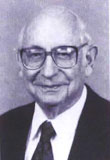|
 Wolpe, Joseph (1915-1997) Wolpe, Joseph (1915-1997)
Joseph Wolpe's groundbreaking work as a behaviorist was grounded in his
belief that behavior therapy was as much an applied science as any other
aspect of medicine. He is probably best known for his work in the areas
of desensitization系统脱敏 and assertiveness training, both of which have become
important elements of behavioral therapy.
He was born on April 20, 1915 in Johannesburg, South Africa, to Michael
Salmon and Sarah Millner Wolpe. He grew up in South Africa and attended
college there, obtaining his M.D. from the University of Witwatersrand.
When the Second World War began, he joined the South African army as a
medical officer. He worked in a military psychiatric hospital, and
witnessed soldiers who were suffering from what would today be called
post-traumatic stress syndrome. At the time, it was known as "war
neurosis," andWolpe and his colleagues first tried to treat the problem
with drug therapy. The results were marginally helpful, however, and
Wolpe decided to work on finding more effective means for dealing with
the problem.
He came up with the concept now known as desensitization. Reasoning that
much of our behavior, both good and bad, is learned, there was no reason
why it could not be unlearned.Wolpe 's initial experiments were with
cats. These animals were given mild electric shocks accompanied by
specific sounds and visual stimuli. Once the cats knew to equate the
unpleasant shock with these images or sounds, the images and sounds
created a feeling of fear. By gradually exposing the cats to these same
sights and sounds-with food being given instead of shocks-the cats
gradually "unlearned" their fear.
Those who suffer phobias-whether rational or unfounded-know that
exposure to the object of fear can be crippling. Modern desensitization
techniques include teaching patients relaxation techniques and gradually
rehearsing stressful situations, until the patient is finally able to
handle the fear-inducing objects.
Sometimes, as Wolpe found out, the problem may not be fear of the object
per se, but a negative association coming from another source. In one
instance,Wolpe tried to desensitize a woman to an inordinate fear of
insects. The usual methods did not work; then Wolpe found out that the
woman's husband, with whom she had not been getting along, was nicknamed
for an insect. The key then was to work on the marital problems. Once
these had been dealt with, the woman's phobia gradually disappeared.
Wolpe's research also led to assertiveness training. As with
desensitization, it requires a gradual move into new behaviors. People
who have trouble asserting themselves are very much like phobics in that
they fear confrontation and conflict, anger in others, and rejection.
Assertiveness training gives them the framework to build their
confidence, relax in formerly stressful situations, and conquer their
fear.
Perhaps Wolpe's most important contribution to psychiatry was that he
managed to combine two seemingly disparate disciplines. Many
psychologists and psychiatrists felt that methods based in applied
science lacked the humanistic touch they felt was so important when
dealing with people. WhatWolpe did was show that effective,
compassionate therapy could be combined with empirical methods in a way
that used both to their best advantage. Among his writings, his books
Pyschotheraphy by Reciprocal Inhibition (1958) and The Practice of
Behavior Therapy (1969) are considered classics in behavior therapy
studies.
After the war, Wolpe worked at the University of Witwatersrand;
later, he moved to the United States, where he initially taught at the
University of Virginia. In 1965, he became a professor of psychiatry at
Temple University Medical School in Philadelphia, a post that he held
until 1988. During this time, he also served as director of the behavior
therapy unit at the nearby Eastern Pennsylvania Psychiatric Institute.
He served as the second president of the Association for the Advancement
of Behavior Therapy, from which he received a lifetime achievement
award.
Wolpe retired in 1988 and moved to California. Once he had settled in
California, however, his retirement did not last long. He began
lecturing at Pepperdine University and continued until a month before
his death. He was married twice. His first wife, whom he married in
1948, was Stella Ettman. She died in 1990, and he married Eva Gyarmati
in 1996. He had two children and three stepchildren. Lung cancer
claimedWolpe's life on December 4, 1998.
Further Reading
Gale Encyclopedia of Psychology, 2nd ed. Gale Group, 2001. |

 Wolpe, Joseph (1915-1997)
Wolpe, Joseph (1915-1997)